Practice the AP 9th Class Social Bits with Answers Chapter 4 Atmosphere on a regular basis so that you can attempt exams with utmost confidence.
AP State Syllabus 9th Class Social Bits 4th Lesson Atmosphere with Answers
Choose the correct answer.
Question 1.
………………. % of oxygen in the atmosphere is
A) 78%
B) 21%
C) 0.3%
D) 33%
Answer:
B) 21%
Question 2.
Which gas dominates in atmosphere by volume?
A) Oxygen
B) Carbon dioxide
C) Nitrogen
D) Argon
Answer:
C) Nitrogen
![]()
Question 3.
The volume of carbon dioxide in atmosphere is
A) 33%
B) 3.3%
C) 0.3%
D) 0.03%
Answer:
D) 0.03%
Question 4.
The volume of water vapour in the atmosphere is
A) 0.4%
B) 0.04%
C) 4%
D) 4.4%
Answer:
A) 0.4%
Question 5.
…………… layer is characterised by uniformity in composition of gases.
A) Heterosphere
B) Thermosphere
C) Homosphere
D) Troposphere
Answer:
C) Homosphere
Question 6.
Lowermost layer of the atmosphere is
A) Stratosphere
B) Mesosphere
C) Troposphere
D) Exosphere
Answer:
C) Troposphere
![]()
Question 7.
…………… layer is free from clouds.
A) Troposphere
B) Mesosphere
C) Stratosphere
D) Ionosphere
Answer:
C) Stratosphere
Question 8.
In which layer conditions are most ideal for flying jet aircrafts?
A) Troposphere
B) Mesosphere
C) Exosphere
D) Stratosphere
Answer:
D) Stratosphere
Question 9.
…………….. layer contains ozone layer.
A) Troposphere
B) Stratosphere
C) Mesosphere
D) Ionosphere
Answer:
B) Stratosphere
Question 10.
…………….. layer consists of electrically charged ions.
A) Troposphere
B) Mesosphere
C) Thermosphere
D) Exosphere
Answer:
C) Thermosphere
![]()
Question 11.
…………… is the highest layer in the atmosphere.
A) Mesosphere
B) Ionosphere
C) Troposphere
D) Exosphere
Answer:
D) Exosphere
Question 12.
The Coriolis effect is ‘O’ at the
A) Tropic of Cancer
B) Tropic of Capricorn
C) Equator
D) Poles
Answer:
C) Equator
Question 13.
Coriolis effect is maximum at the
A) Equator
B) Poles
C) Tropic of Cancer
D) Tropic of Capricorn
Answer:
B) Poles
Question 14.
The pressure and wind systems are actually the impact of
A) Lithosphere
B) Hydrosphere
C) Atmosphere
D) All the three
Answer:
D) All the three
![]()
Question 15.
Foehn – the hot winds blow along the northern slopes of the
A) Rockies
B) Andes
C) Alps
D) Himalayas
Answer:
C) Alps
Question 16.
Water vapour is a
A) liquid
B) solid
C) gas
D) plasma
Answer:
C) gas
Question 17.
Most gaseous matter of atmosphere is present in
A) Mesosphere
B) Thermosphere
C) Stratosphere
D) Troposphere
Answer:
D) Troposphere
Question 18.
Stratosphere contains ……………. layer.
A) Plasma
B) Ozone
C) Gas
D) None
Answer:
B) Ozone
Question 19.
…………………. is also called Ionosphere.
A) Thermosphere
B) Exosphere
C) Stratosphere
D) Mesosphere
Answer:
A) Thermosphere
![]()
Question 20.
Vascoda Gama, who invented sea route to India is from
A) Spain
B) Poland
C) France
D) Portugal
Answer:
D) Portugal
Question 21.
To form dew drops, relative humidity should be
A) 100%
B) 80%
C) 20%
D) 200%
Answer:
A) 100%
Question 22.
Rain bearing and vertical clouds are called as
A) Cirrus
B) Cumulus
C) Stratus
D) Nimbus
Answer:
D) Nimbus
Question 23.
Convectional rainfall is uncommon in
A) high latitudes
B) low latitudes
C) summer days
D) interior parts
Answer:
A) high latitudes
![]()
Question 24.
‘Cyclone’ is derived from ‘Kyklon’ in Greek |peans
A) blowing
B) revolving
C) raising
D) raining
Answer:
B) revolving
Question 25.
Between latitudes 100 and 300 N and S
A) heavy rain on eastern coast
B) heavy rain on western coast
C) no rain on eastern coast
D) no rain on western coast
Answer:
A) heavy rain on eastern coast
Question 26.
Identify the odd one
A) Norwester
B) Mistral
C) Simmon
D) Yoma
Answer:
B) Mistral
Question 27.
Identify the odd one
A) Chinook
B) Loo
C) Norwester
D) Puna
Answer:
D) Puna
Question 28.
Electrically charged particles present in
A) Exosphere
B) Thermosphere
C) Mesosphere
D) Stratosphere
Answer:
B) Thermosphere
![]()
Question 29.
Meteorites burn up in this layer
A) Exosphere
B) Thermosphere
C) Mesosphere
D) Stratosphere
Answer:
C) Mesosphere
Question 30.
Precipitation derived from ‘Praecipitatio’ of
A) Arabic
B) Greek
C) Hebrew
D) Latin
Answer:
D) Latin
Question 31.
The dust particles present in the air are called
A) particulates
B) water vapour
C) humidity
D) oxygen
Answer:
A) particulates
Question 32.
The average height of the troposphere is
A) 18 km
B) 8 km
C) 13 km
D) 16 km
Answer:
C) 13 km
![]()
Question 33.
Radio waves are reflected back to the earth from
A) the troposphere
B) the stratosphere
C) the exosphere
D) the thermosphere
Answer:
D) the thermosphere
Question 34.
If temperature increases, the air pressure
A) decreases
B) increases
C) stable
D) becomes zero
Answer:
A) decreases
Question 35.
If air moves in a slow pace, it is called
A) storm
B) gust
C) breeze
D) cyclone
Answer:
C) breeze
Question 36.
If air moves very fast and blows the things around, it is called
A) storm
B) gust
C) breeze
D) cyclone
Answer:
A) storm
![]()
Question 37.
The westerlies are an example of winds.
A) planetary winds
B) seasonal winds
C) cyclonic winds
D) local winds
Answer:
A) planetary winds
Question 38.
Monsoon is derived from the word Mausam.
A) Arabic
B) French
C) Latin
D) Greek
Answer:
A) Arabic
Question 39.
……………. is an example of hot wind.
A) Mistral
B) Puna
C) Pampero
D) Loo
Answer:
D) Loo
Question 40.
……………… is an example of hot local wind.
A) Chinook
B) Puna
C) Mistral
D) Pampero
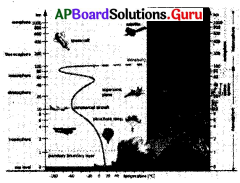
Answer:
A) Chinook
Question 41.
The height of troposphere at equator is
A) 10 kms
B) 15 kms
C) 18 kms
D) 20 kms
Answer:
C) 18 kms
![]()
Question 42.
Jet aircrafts are flying in this sphere
A) Mesosphere
B) Thermosphere
C) Exosphere
D) Stratosphere
Answer:
D) Stratosphere
Question 43.
Stratosphere layer extends up to a height of ………….. kms.
A) 50
B) 60
C) 70
D) 90
Answer:
A) 50
Question 44.
Radio waves are transmitted in this sphere
A) Exosphere
B) Thermosphere
C) Troposphere
D) Mesosphere
Answer:
B) Thermosphere
Question 45.
All the weather changes that occurred in
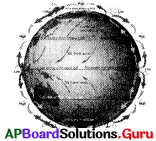
A) Troposphere
B) Stratosphere
C) Ionosphere
D) Exosphere
Answer:
A) Troposphere
![]()
Question 46.
The westerlies are blowing towards
A) Sub-polar low-pressure belts
B) Equatorial low-pressure belts
C) Sub tropical high-pressure belts
D) None
Answer:
A) Sub-polar low-pressure belts
Question 47.
Trade winds are blowing towards the
A) Sub tropical high pressure belts
B) The equatorial doldrums
C) Sub polar low pressure belts
D) None
Answer:
B) The equatorial doldrums
Question 48.
The equatorial low pressure belts are also known as
A) ITCZ
B) IPEC
C) ISON
D) None
Answer:
A) ITCZ
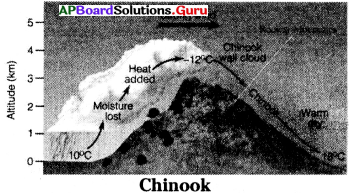
Question 49.
What is the local wind name of Canada?
A) Simoon
B) Loo
C) Yoma
D) Chinook
Answer:
D) Chinook
![]()
Question 50.
Chinook is a …………. wind.
A) Hot
B) Cool
C) Moderate
D) None
Answer:
A) Hot
Question 51.
Simoon is the local wind of
A) Argentina
B) Saudi Arabia
C) Japan
D) Europe
Answer:
B) Saudi Arabia
Question 52.
Local wind of India is
A) Fohn
B) Mistral
C) Loo
D) Puna
Answer:
C) Loo
Question 53.
Norwester is the focal wind of
A) England
B) Newzealand
C) Australia
D) India
Answer:
B) Newzealand
![]()
Match the following.
Question 54.
Group – A — Group – B
1. Troposphere — A) Meteorites burn up
2. Stratosphere — B) Ions
3. Mesosphere — C) Uppermost layer
4. Thermosphere — D) Jet aircrafts
5. Exosphere — E) Weather phenomenon
Answer:
1) E
2) D
3) A
4) B
5) C
Question 55.
Group – A — Group – B
1. Wind — A) Short and fast burst
2. Breeze — B) Moves very fast and blows things around
3. Gust — C) High-speed winds
4. Storm — D) From high-pressure areas to low-pressure areas
5. Cyclone — E) Moves at a slow pace
Answer:
1) D
2) E
3) A
4) B
5) C
Question 56.
Group – A — Group – B
1. Chinook — A) From the Alps to the Mediterranean sea
2. Loo — B) Andes region
3. Mistral — C) Rocky mountains in the U.S.A
4. Puna — D) South America
5. Pampero — E) Plains of northern India
Answer:
1) C
2) E
3) A
4) B
5) D
![]()
Question 57.
Group – A — Group – B
1. Foehn — A) Causes sunstroke to people
2. Simoon — B) Japan
3. Yoma — C) Europe
4. Norwester — D) Arabian desert
5. Loo — E) New Zealand
Answer:
1) C
2) D
3) B
4) E
5) A
Question 58.
Group – A — Group – B
1. Cirrus clouds — A) Rain bearing, vertical clouds
2. Cumulus — B) At a lower level
3. Stratus — C) At a higher level
4. Nimbus — D) At middle level
Answer:
1) C
2) D
3) B
4) A
Question 59.
Match the foilowing
1) Troposphere a) Meteorites
2) Stratosphere b) Radio Waves
3) Mesophere c) Life
4) Thermosphere d) Jet aircrafts
A) 1 – a, 2 – b, 3 – c, 4 – d
B) 1 – c, 2 – d, 3 – a, 4 – b
C) 1 – b, 2 – c, 3 – d, 4 – a
D) 1 – d, 2 – c, 3 – b, 4 – a
Answer:
B) 1 – c, 2 – d, 3 – a, 4 – b
Question 60.
The activeness of South West monsoon in India is affected by:
A) El Nino only
B) La Nino only
C) Both El Nino and La Nino
D) None of these two
Answer:
A) El Nino only
![]()
Question 61.
Highest waterfall in the world is:
A) Jog Falls
B) Angel Falls
C) Niagara Falls
D) Victoria falls
Answer:
B) Angel Falls
Question 62.
The Greek ‘Pros’ means:
A) Rainfall
B) Mountain
C) Humidity
D) Wind
Answer:
B) Mountain
Question 63.
Stratosphere is most ideal for flying jet aircrafts because:
A) Entire weather phenomenon happens in this sphere
B) Clouds do not exist in this sphere
C) Electrically charged ions exist in this sphere
D) Meteorites burn up in this sphere
Answer:
B) Clouds do not exist in this sphere
Question 64.
The entire weather phenomenon happens in ………….. layer.
A) Mesosphere
B) Troposphere
C) Stratosphere
D) Exosphere
Answer:
B) Troposphere
![]()
Question 65.
Choose the wrong paid from given below,
A) Troposphere – Average Height -13 kms.
B) Stratosphere – Extends of 50 Kms.
C) Mesosphere-Extends up to 400 Kms.
D) Exosphere – Upper most layer.
Answer:
C) Mesosphere-Extends up to 400 Kms.
Question 66.
……………. wing helps in ripening grapes in Europe
A) Foehn
B) Chinook
C) pampero
D) Loo
Answer:
A) Foehn
Question 67.
The hot and dry winds blow in north India in the months of May and June.
A) Chinook
B) Loo
C) Simoon
D) Mistrol
Answer:
B) Loo
Question 68.
The winds that blow continuously and regularly above the world pressure belts are known as
A) Monsoon winds
B) Planetary winds
C) Local winds
D) Hot and dry winds
Answer:
B) Planetary winds
![]()
Question 69.
Why is the ozone layer important?
A) It increases crop yields and forest growth.
B) It protects living organisms from ultraviolet – B radiation from the Sun.
C) It controls air motion and prevents hurricanes from forming.
D) It slows down global warming.
Answer:
B) It protects living organisms from ultraviolet – B radiation from the Sun.
Question 70.
The coriolis effect is caused by
A) The rotation of the Earth around in the Sun
B) The rotation of Earth on its axis
C) The revolution of moon around the Earth
D) The Gravitational power of the Earth
Answer:
B) The rotation of Earth on its axis
Question 71.
Which of the following is an example of planetary wind?
A) Westerlies
B) South West monsoon
C) See breeze
D) Loo
Answer:
A) Westerlies
Question 72.
The recent floods due to the South West Monsoons mostly affected which of the following States?
A) Rajasthan
B) Andhra Pradesh
C) Kerala
D) Karnataka
Answer:
C) Kerala
![]()
Question 73.
The temperature increases with altitude in Stratosphere because:
A) It contains ions.
B) It contains transparent clouds.
C) It is not so far from the Earth.
D) The ozone layer that presents in it absorbs the ultraviolet rays of the sun.
Answer:
D) The ozone layer that presents in it absorbs the ultraviolet rays of the sun.
Question 74.
The rainfall in India occurs mainly due to:
A) Seasonal winds
B) Planetary winds
C) Cyclonic winds
D) Local winds
Answer:
A) Seasonal winds
Question 75.
Observe the picture given below.
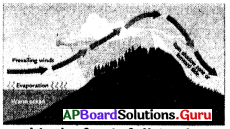
What kind of rainfall is shown on the picture?
A) Orographic rainfall
B) Cyclonic rainfall
C) Only snowfall
D) Convectional rainfall
Answer:
A) Orographic rainfall
Question 76.
The central part of Deccan Plateau receives low rainfall because:
A) It is situated in rain shadow region
B) It contains less forest area
C) It is becoming a desert
D) It contains no ground water
Answer:
A) It is situated in rain shadow region
![]()
Question 77.
Find out the correct statement among the following regarding the rainfall across the globe:
A) Rainfall is heavier in deserts.
B) Low rainfall in equatorial regions.
C) Rainfall is more over the oceans that on the continents.
D) Heavy rains in the polar regions.
Answer:
C) Rainfall is more over the oceans that on the continents.
Instruction: Based on the information given below, answer the questions from 78 to 82.
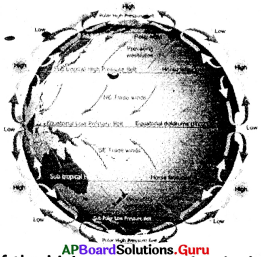
Question 78.
If the high pressure region is denoted by A and low pressure region is denoted by B, then the winds:
A) Flow from B to A
B) Flow from A to A
C) Flow from B to B
D) Flow from A to B
Answer:
A) Flow from B to A
Question 79.
The winds that flow from West to East are called:
A) Western winds only
B) Either Eastern winds or western winds
C) Eastern and western winds
D) Eastern winds only
Answer:
A) Western winds only
Question 80.
The winds that blow from sub-tropical high pressure belt to equatorial low pressure belt are:
A) Eastern winds
B) Western winds
C) Trade winds
D) Polar winds
Answer:
C) Trade winds
![]()
Question 81.
Which among the following is called Inter-Tropical Convergence Zone?
A) Sub-polar low-pressure belt
B) Sub-tropical high pressure belt
C) Equatorial low-pressure belt
D) Polar high pressure belt
Answer:
C) Equatorial low-pressure belt
Question 82.
All the winds that are shown in the above picture are:
A) Monsoon winds
B) Planetary winds
C) Cyclonic winds
D) Local winds
Answer:
B) Planetary winds
Question 83.
Due to the Coriolis Effect, the winds slightly blow aside. These winds:
A) blow to the left in Northern hemi-sphere and to the right in Southern hemisphere.
B) blow to the right in both the Northern and Southern hemispheres.
C) blow to the left in both the Northern and Southern hemispheres.
D) blow to the right in Northern hemi-sphere and to the left in Southern hemisphere.
Answer:
D) blow to the right in Northern hemi-sphere and to the left in Southern hemisphere.
Question 84.
Which among the following is a false statement regarding El Nino and La Nino?
A. These are influencing South-West monsoons.
B. These are influencing Indian agriculture
C. These lead to the situations of droughts and floods.
D. These are caused by the changes of temperature in the Indian Ocean.
A) C, D
B) C
C) D
D) A, B
Answer:
C) D
![]()
Question 85.
We know very little till today about this layer of the atmosphere:
A) Mesosphere
B) Thermosphere
C) Exosphere
D) Stratosphere
Answer:
C) Exosphere
Question 86.
The hot winds which we face in our region in summer are:
A) Seasonal winds
B) Local winds
C) Cyclonic winds
D) Planetary winds
Answer:
B) Local winds
Question 87.
This is not a property of atmosphere:
A) Atmosphere has a specific shape
B) Atmosphere compresses
C) Atmosphere expands
D) Atmosphere is composed of many gases
Answer:
A) Atmosphere has a specific shape
Question 88.
Ozone depletion in the stratosphere will cause:
A) Forest fires
B) Increased incidence of skin cancer
C) Global warming
D) Extra-terrestrial hazards
Answer:
B) Increased incidence of skin cancer
![]()
Question 89.
Winds blowing from the sub-tropical High-Pressure belts to the equatorial Low-Pressure belts are called as
A) The westerlies
B) The polar easterlies
C) The seasonal winds
D) The trade winds
Answer:
D) The trade winds
Question 90.
Look at the diagram below.
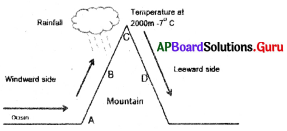
Which location shown in the diagram could possibly a desert?
A) Location A
B) Location B
C) Location C
D) Location D
Answer:
D) Location D
Question 91.
Choose the planetary wind
A) South West Monsoon
B) Mistral
C) Loo
D) Westerlies
Answer:
D) Westerlies
![]()
Question 92.
Which graph does BEST show the general relationship between altitude and temperature in the troposphere?
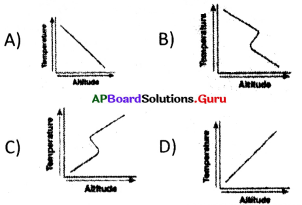
Answer:
A)